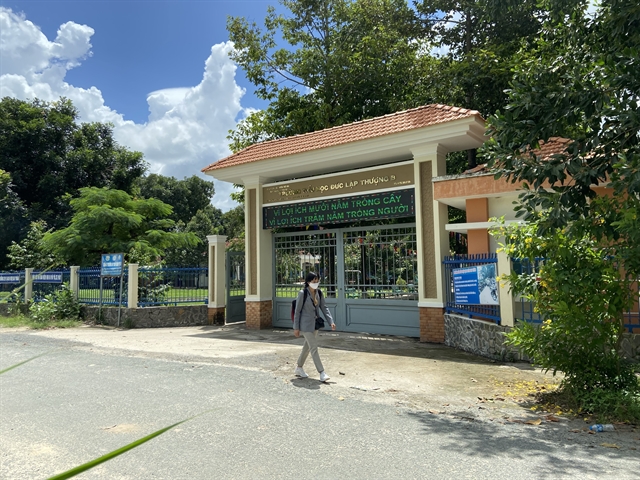 Society
Society

 |
| The Đức Lập Thượng B Primary School in Đức Lập Thượng Commune in Long An Province’s Đức Hòa District meets national standards. — VNA/VNS Photo Đức Hạnh |
LONG AN — Long An Province has taken efforts to improve its education and training to meet the requirements of high-quality human resources for industrialisation and modernisation.
Located in a gateway of the Cửu Long (Mekong) Delta and neighbouring HCM City, the province has a favourable location, infrastructure and policies to attract investors who require high quality workers.
The province has focused on investing in infrastructure facilities for schools and colleges in past years to improve their education and training quality, according to its Department of Education and Training.
It has 591 schools from pre-school to high-school level in its 188 communes, wards and towns, and 54 per cent of these schools have met the national standards.
Many schools have been built by investors, and this helps meet learning demands of the students, especially in places that have many industrial parks.
The province’s recruiting and training of teachers have basically met the demand of the education system.
Last year, the province fulfilled the requirement for pre-school universalisation for children aged five.
Up to 82 per cent of young people aged 18-21 have a high school education or an equivalent education level.
It has two private universities and its Teacher Training College will soon be upgraded into a university.
Lê Quốc Hùng, rector of Long An College in Tân An City, said: “The college has received State investment in building facilities and buying equipment for vocational training.”
The college will invest VNĐ152 billion (US$6.3 million) from local and central Government budgets during 2021-25 to develop facilities and equipment for teaching, he said.
It is supported by the International Co-operation Agency of Germany to implement digital transformation and quality accreditation to meet the criteria of a high-quality college, he said.
The province Department of Labour, Invalids and Social Affairs has instructed vocational schools to provide labourers vocational skills that meet market requirements.
Vocational establishments and schools in the province have co-operated with more than 200 companies at home and abroad to provide vocational skills for local students and create jobs for them.
They have also linked with universities in HCM City and the delta’s other provinces and Cần Thơ City to provide university education.
The rate of skilled workers in the province reaches 73.9 per cent, according to the province Department of Labour, Invalids and Social Affairs.
Skilled workers who have a training certificate and diploma account for 32.4 per cent of the province’s total workers, said the department.
The province has sent more than 1,000 workers aged 18-30 working overseas since 2020 and more than 90 per cent of them work in Japan.
Nguyễn Hồng Mai, director of the Department of Labour, Invalids and Social Affairs, said labourers working overseas can access advanced science and technology, gain industrial working experience, and are high quality human resources for the province’s social-economic development after they return home.
After returning home, former oversea workers are introduced to work at companies and enterprises in the province by the province’s Employment Service Centre.
Comprehensive renovation
Nguyễn Quang Thái, director of the Department of Education and Training, said the province is implementing general education in 2019-25 and improving its education quality.
It is boosting the application of information technology and digital transformation in education and training in 2022-25, he said.
The province also strengthens the education of ethic, lifestyle and life skills for students, enhances the effectiveness of co-operation among parents and schools, and boosts advocacy activities to change the thinking of students and their parents about learning vocational skills, he said.
“These efforts aim to implement the province’s target of maintaining its leading position in the Cửu Long Delta by 2025, and becoming a wealthy province in the southern key economic region by 2030,” he said.
The province is spending VNĐ6.7 billion ($275,000) to implement a plan to provide vocational training and management skills for 6,200 labourers who work in the agriculture sector in 2023-25, according to its People’s Committee.
The plan aims to meet the requirements of commercial agriculture on a large scale, restructuring agriculture and building new-style rural areas.
The People’s Committee has assigned the Department of Agriculture and Rural Development in co-operation with relevant departments, agencies and localities to implement the plan. – VNS




